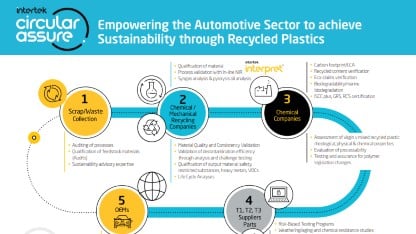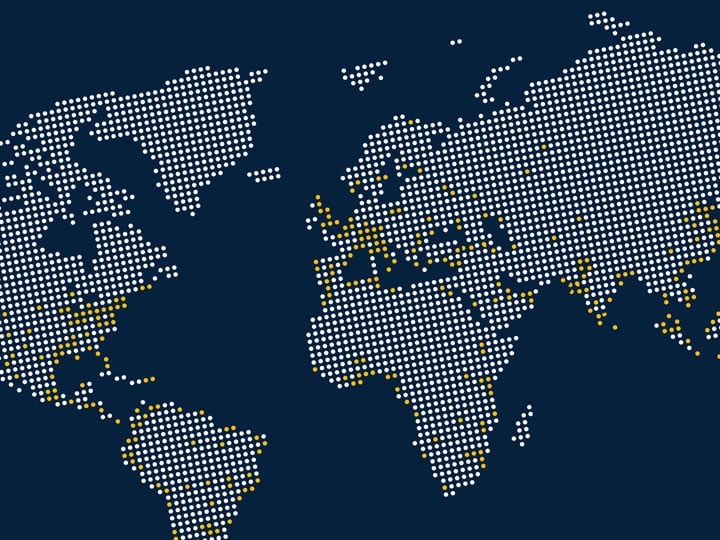Test programs for quality, consistency and performance of automotive plastic parts and materials boosting sustainability in the automotive industry and automotive plastic recycling
In response to growing environmental concerns, automotive sustainability initiatives increasingly turn to recycled plastic materials for car manufacturing. This trend reflects a broader shift in this sector, aiming to reduce carbon footprints and plastic waste. Recycled plastics offer the dual benefit of minimizing raw material consumption while diverting waste from landfills, aligning with global efforts to achieve greener manufacturing practices. As technology advances, manufacturers are refining processes to ensure materials containing recycled plastics meet stringent safety and performance standards, driving further adoption across the industry.
In the EU, the proposed End-of-Life Vehicles Regulation sets a target for 25% of automotive plastic parts in new cars to be made from recycled materials, with a quarter sourced from other ELVs. This aims to reduce waste, recover valuable resources, and improve sustainability across the vehicle lifecycle. With over six million vehicles reaching end-of-life annually, the proposed regulation strengthens existing frameworks to ensure proper recycling and producer responsibility. Whilst the industry is moving towards producing a car made out of recycled materials, frameworks such as the ELV do help to address the need for a holistic approach to end-of-life recycling —from vehicle design to final treatment— fostering automotive recycling, promoting sustainable materials in car design across the vehicle lifecycle and also high-quality recycled plastics that meet safety and performance standards.
At Intertek, we are committed to helping businesses navigate this regulatory landscape through our comprehensive testing programs that support automotive plastic recycling. Our focus is on monitoring the quality and consistency of polymers and plastic for cars derived from recycling vehicles and automotive waste management. With over 30 years’ experience being involved in global OEM specification test programs, we aim to help stakeholders across the automotive supply chain to ensure that recycled materials meet established safety and quality benchmarks.
Risk-Based Testing Programs:
We employ expert insight in our testing methodologies to identify potential contaminants—such as heavy metals and volatile organic compounds (VOCs)—that may compromise the safety and performance of recycled materials. This proactive approach mitigates risks and ensures compliance with stringent environmental regulations.
Analytical services related to GADSL
Quality and Consistency Assurance:
The quality and consistency of materials from automotive plastic recycling is paramount. Our services include rigorous mechanical property testing and batch-to-batch consistency evaluations. This comprehensive assessment guarantees that the recycled plastics used in vehicle production are reliable, enhancing both product safety and consumer trust.
Restricted Substance Management:
Our team is proficient in identifying and testing for restricted substances as specified in the EU regulations. By rigorously screening materials, we ensure compliance with EU directives and protect manufacturers from potential regulatory fines and reputational damage.
Tailored Solutions:
We understand that every business has unique needs. Our custom testing programs can be designed specifically to address the challenges faced by manufacturers dealing with recycled materials. We offer consultancy and support to help streamline operations and enhance sustainability practices.
ELV Compliance Support:
Our global compliance solutions for the End-of-Life Vehicle Directive (ELV) include ELV consulting, support for technical file documentation, Bill of Material (BoM) assessments, compliance assurance, trace detection of hazardous substances, and education and training on ELV requirements.
Support for the ELV value chain:
Scrap/waste Collection:
- Auditing of processes
- Qualification of feedstock materials (Audits)
- Sustainability advisory expertis
Mechanical Recycling:
- Material quality and consistency validation
- Validation of decontamination efficiency through analysis and challenge testing
- Qualification of output material: safety, restricted substances, heavy metals, VOCs
- Life Cycle Analyses
- Support for process development
Polymer Companies:
- Carbon footprint/LCA
- Recycled content verification
- Eco-claims verification
- Biodegradability/marine biodegradation
- ISCC plus, GRS, RCS certification
- Assessment of virgin v mixed recycled plastic: rheological, physical & chemical properties
- Evaluation of processability
- Testing and assurance for polymer legislation changes
T1, T2, T3 Suppliers:
- Risk-Based Testing Programs
- OEM specification test programs
- Weathering/aging and chemical resistance studies
- Substance identification, e.g. VOC Screening, metals
- Alternative materials vs current established materials
- Recycled content verification, Eco-claims verification
- Performance testing supporting lightweighting, incorporation of production waste and crash testing
- Design for recycling & sustainability consulting
OEMs
- OEM Specification test programs
- Risk assessment on plastic impurities and supply chain information
- Chemical, rheological, physical/failure testing
- Substance identification, e.g. VOC Screening, metals
- Procurement support and certification for supplier
Your Partner for Recycled Materials Quality Assurance
With the proposed regulation on end-of-life vehicles, the European automotive industry is stepping towards a more sustainable future. At Intertek, we are here to assist you at every stage of this transition. Our specialized testing programs not only help ensure compliance with the new regulations but also promote a circular economy by enhancing the quality of recycled materials. Together, we can pave the way for a greener and more sustainable automotive industry, contributing to a healthier planet for future generations.
Knowledge Center
Buzz, Squeak, and Rattle (BSR) Testing in Automotive Development Webinar
Master FMVSS 108 Compliance – Download the Expert Guide
Automotive Functional Safety & Cyber Security FAQs
Development of Driveline Electrification Technologies White Paper
Understanding Failure Analysis and Answering your Frequently Asked Questions
The Top-7 FAQs of Autonomous Vehicles Testing
The Top-10 FAQs of Advanced Composites Testing
The Top-10 FAQs of Automotive Interior Testing
Accelerated Stress Testing to Manage Disruptive Market Changes Webinar
Transitioning to Structural Composites to Meet CAFE Standards
Automotive Interiors Testing White Paper
Resources
Global Research & Certification
SatelliteTM Client Test Program
Engineering and Technical Staffing
SupplyTek - gain the confidence to go to market faster
Protek - safeguard people, systems and processes, facilities, materials and surfaces, and products

